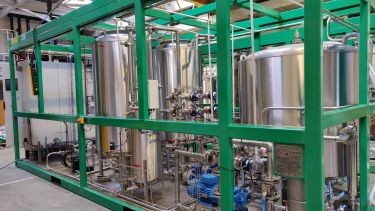Project flexJET, a consortium project which aims to engineer a high-quality sustainable jet fuel from bio-materials, has beaten more than 300 other EU-funded projects to win the Most Innovative Biotech at the 2020 KETBIO Conference.
Made up of partners from five different European countries and led by the University of Birmingham, flexJET aims to research and commercialise a novel route to sustainable fuels for aviation, and in particular those which are derived from biological materials such as waste vegetable oil and organic waste biomass.
Their win comes after a shortlist of 79 projects was drawn up, and each analysed for its impact, TRL, industry involvement and more. The best-ranked projects were then selected by the Commercial Committee of KETBIO, the HORIZON 2020-funded project which works to increase market update in biotechnology.
Project flexJET is currently constructing Europe's first pre-commercial demonstration plant to produce the fuel. The novel process the plant uses ensures a high-quality advanced aviation fuel which is derived from variable waste oils and fats.
The innovative, highly-scalable technology combines the production of sustainable aviation fuel through the refining of biofuel with Thermo-Catalytic Reforming (TCR®) technology which provides green hydrogen. The hydrogen is then separated through pressure swing adsorption (PSA). Using hydrogen from residual biomass conversion and using renewable process energy enables a significant reduction in the remaining CO2 footprint.
Progress so far has seen the collaboration of the consortium's research and industry experts to set the benchmark for the development of future jet fuels that can be produced at both a large and decentralised scale economically whilst simultaneously addressing social and environmental needs. Once the project is completed a scaled-up first commercial plant is planned, which will be able to produce 25,000 tonnes per year of the bio-derived aviation fuel.
Researchers from the University of Sheffield's Low Carbon Combustion Centre, part of Energy 2050 and the Department of Mechanical Engineering, have been supporting the flexJET project with the assessment of the technical compatibility of the fuel and its performance. This assessment has been in close collaboration with Green Fuels Ltd and the team at the University of Birmingham, using small volumes of fuel to carry out early stage fuel characterisation such as distillation and assessment of thermal stability.
The team at the University of Sheffield will continue to provide support to the project through additional testing as the flexJET production ramps up, culminating with engine tests on the fuel as a final validation of its suitability. This work will result in a formal report to be reviewed by the technical authorities for the use of the flexJET final fuel in flight.


